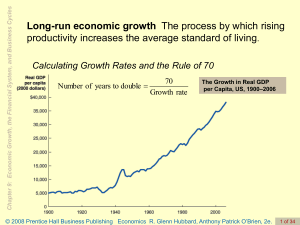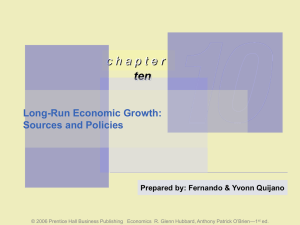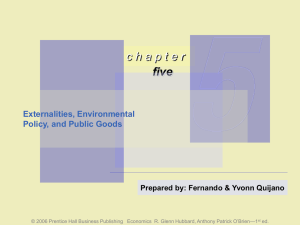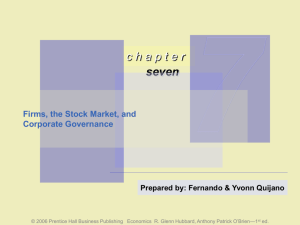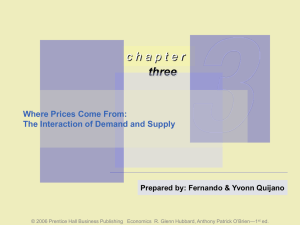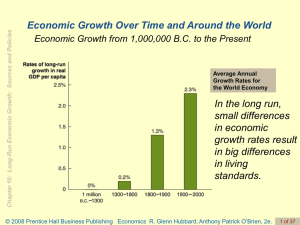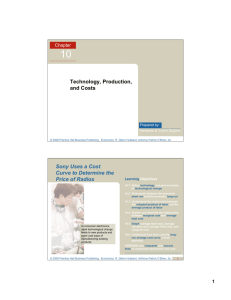Economics, by R. Glenn Hubbard and Anthony Patrick O'Brien
advertisement
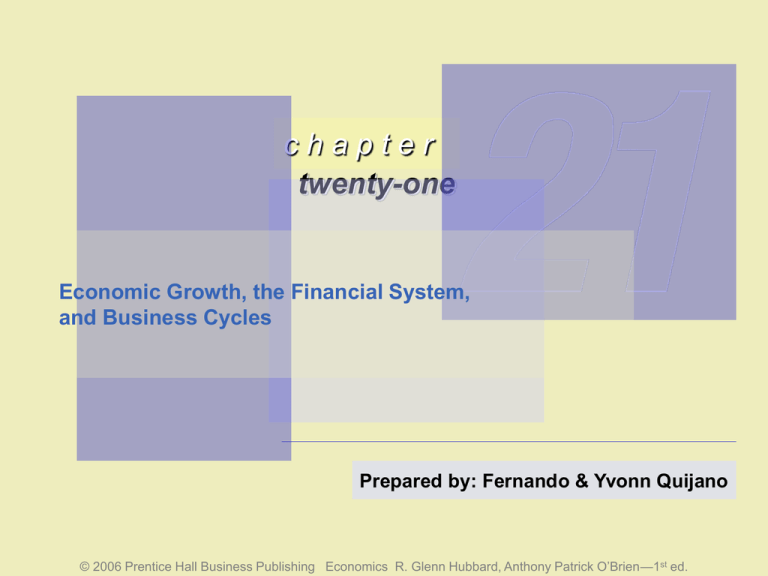
chapter twenty-one Economic Growth, the Financial System, and Business Cycles Prepared by: Fernando & Yvonn Quijano © 2006 Prentice Hall Business Publishing Economics R. Glenn Hubbard, Anthony Patrick O’Brien—1st ed. After studying this chapter, you should be able to: In this chapter we will look more closely at long-run growth and at the business cycle, both of which have had important implications for individual firms and for the economy as a whole. LEARNING OBJECTIVES CHAPTER 21: Economic Growth, the Financial System, and Business Cycles Growth and the Business Cycle at the Ford Motor Company 1 Discuss the importance of long-run economic growth. 2 Discuss the role of the financial system in facilitating long-run economic growth. 3 Explain what happens during a business cycle. © 2006 Prentice Hall Business Publishing Economics R. Glenn Hubbard, Anthony Patrick O’Brien—1st ed. 2 of 29 CHAPTER 21: Economic Growth, the Financial System, and Business Cycles Economic Growth, the Financial System, and Business Cycles Business cycle Alternating periods of economic expansion and economic recession. © 2006 Prentice Hall Business Publishing Economics R. Glenn Hubbard, Anthony Patrick O’Brien—1st ed. 3 of 29 1 LEARNING OBJECTIVE CHAPTER 21: Economic Growth, the Financial System, and Business Cycles Long-Run Economic Growth Is the Key to Rising Living Standards Long-run economic growth The process by which rising productivity increases the average standard of living. 21 - 1 The Growth in Real GDP per capita, 1900-2004 © 2006 Prentice Hall Business Publishing Economics R. Glenn Hubbard, Anthony Patrick O’Brien—1st ed. 4 of 29 CHAPTER 21: Economic Growth, the Financial System, and Business Cycles 21 - 1 The Connection Between Economic Prosperity and Health Because of technological advance, these children will live longer, be healthier, and work less than their parents and grandparents. © 2006 Prentice Hall Business Publishing Economics R. Glenn Hubbard, Anthony Patrick O’Brien—1st ed. 5 of 29 CHAPTER 21: Economic Growth, the Financial System, and Business Cycles Long-Run Economic Growth Is the Key to Rising Living Standards Calculating Growth Rates and the Rule of 70 70 Number of years to double Growth rate What Determines the Rate of Long-Run Growth? Labor productivity The quantity of goods and services that can be produced by one worker or by one hour of work. INCREASES IN CAPITAL PER HOUR WORKED Capital Manufactured goods that are used to produce other goods and services; examples of capital are computers, factory buildings, machine tools, warehouses, and trucks. © 2006 Prentice Hall Business Publishing Economics R. Glenn Hubbard, Anthony Patrick O’Brien—1st ed. 6 of 29 CHAPTER 21: Economic Growth, the Financial System, and Business Cycles Long-Run Economic Growth Is the Key to Rising Living Standards What Determines the Rate of Long-Run Growth? INCREASES IN CAPITAL PER HOUR WORKED Human capital The accumulated knowledge and skills that workers acquire from education and training, or from their life experiences. TECHNOLOGICAL CHANGE 21-1 1 LEARNING OBJECTIVE The Role of Technological Change in Growth © 2006 Prentice Hall Business Publishing Economics R. Glenn Hubbard, Anthony Patrick O’Brien—1st ed. 7 of 29 CHAPTER 21: Economic Growth, the Financial System, and Business Cycles 21 - 2 What Explains Rapid Economic Growth in Botswana? Firms like the Botswana Meat Company benefit from government policies that protect private property. © 2006 Prentice Hall Business Publishing Economics R. Glenn Hubbard, Anthony Patrick O’Brien—1st ed. 8 of 29 CHAPTER 21: Economic Growth, the Financial System, and Business Cycles Long-Run Economic Growth Is the Key to Rising Living Standards Potential Real GDP Potential GDP The level of GDP attained when all firms are producing at capacity. 21 - 2 Actual and Potential Real GDP © 2006 Prentice Hall Business Publishing Economics R. Glenn Hubbard, Anthony Patrick O’Brien—1st ed. 9 of 29 2 LEARNING OBJECTIVE CHAPTER 21: Economic Growth, the Financial System, and Business Cycles Saving, Investment, and the Financial System Financial system The system of financial markets and financial intermediaries through which firms acquire funds from households. An Overview of the Financial System © 2006 Prentice Hall Business Publishing Economics R. Glenn Hubbard, Anthony Patrick O’Brien—1st ed. 10 of 29 CHAPTER 21: Economic Growth, the Financial System, and Business Cycles Saving, Investment, and the Financial System The Macroeconomics of Saving and Investment S Sprivate Spublic S (Y TR C T ) (T G TR) S Y C G © 2006 Prentice Hall Business Publishing Economics R. Glenn Hubbard, Anthony Patrick O’Brien—1st ed. 11 of 29 CHAPTER 21: Economic Growth, the Financial System, and Business Cycles Saving, Investment, and the Financial System The Market for Loanable Funds Market for loanable funds The interaction of borrowers and lenders that determines the market interest rate and the quantity of loanable funds exchanged. THE DEMAND AND SUPPLY IN THE LOANABLE FUNDS MARKET © 2006 Prentice Hall Business Publishing Economics R. Glenn Hubbard, Anthony Patrick O’Brien—1st ed. 12 of 29 CHAPTER 21: Economic Growth, the Financial System, and Business Cycles Saving, Investment, and the Financial System The Market for Loanable Funds 21- 3 The Market for Loanable Funds © 2006 Prentice Hall Business Publishing Economics R. Glenn Hubbard, Anthony Patrick O’Brien—1st ed. 13 of 29 CHAPTER 21: Economic Growth, the Financial System, and Business Cycles 21 - 3 Ebenezer Scrooge: Accidental Promoter of Economic Growth? Who was better for economic growth: Scrooge the saver, or Scrooge the spender? © 2006 Prentice Hall Business Publishing Economics R. Glenn Hubbard, Anthony Patrick O’Brien—1st ed. 14 of 29 CHAPTER 21: Economic Growth, the Financial System, and Business Cycles Saving, Investment, and the Financial System The Market for Loanable Funds EXPLAINING MOVEMENTS IN SAVING, INVESTMENT, AND INTEREST RATES 21 - 4 An Increase in the Demand for Loanable Funds © 2006 Prentice Hall Business Publishing Economics R. Glenn Hubbard, Anthony Patrick O’Brien—1st ed. 15 of 29 CHAPTER 21: Economic Growth, the Financial System, and Business Cycles Saving, Investment, and the Financial System The Market for Loanable Funds EXPLAINING MOVEMENTS IN SAVING, INVESTMENT, AND INTEREST RATES 21 - 5 The Effect of a Budget Deficit on the Market for Loanable Funds © 2006 Prentice Hall Business Publishing Economics R. Glenn Hubbard, Anthony Patrick O’Brien—1st ed. 16 of 29 CHAPTER 21: Economic Growth, the Financial System, and Business Cycles 21-2 2 LEARNING OBJECTIVE How Would a Consumption Tax Affect Saving, Investment, the Interest Rate, and Economic Growth? © 2006 Prentice Hall Business Publishing Economics R. Glenn Hubbard, Anthony Patrick O’Brien—1st ed. 17 of 29 3 LEARNING OBJECTIVE CHAPTER 21: Economic Growth, the Financial System, and Business Cycles The Business Cycle Some Basic Business Cycle Definitions 21 - 6 Movements in Real GDP, 1998-2004 © 2006 Prentice Hall Business Publishing Economics R. Glenn Hubbard, Anthony Patrick O’Brien—1st ed. 18 of 29 CHAPTER 21: Economic Growth, the Financial System, and Business Cycles 21 - 4 Who Decides If the Economy Is In a Recession? The National Bureau of Economic Research determines when recessions begin and end. PEAK TROUGH LENGTH OF RECESSION July 1953 May 1954 10 months August 1957 April 1958 8 months April 1960 February 1961 10 months December 1969 November 1970 11 months November 1973 March 1975 16 months January 1980 July 1980 6 months July 1981 November 1982 16 months July 1990 March 1991 8 months March 2001 November 2001 8 months © 2006 Prentice Hall Business Publishing Economics R. Glenn Hubbard, Anthony Patrick O’Brien—1st ed. 19 of 29 CHAPTER 21: Economic Growth, the Financial System, and Business Cycles The Business Cycle What Happens During a Business Cycle? THE EFFECT OF THE BUSINESS CYCLE ON AUTOMOBILE PRODUCTION 21 - 7 The Effect of the Business Cycle on Automobile Production © 2006 Prentice Hall Business Publishing Economics R. Glenn Hubbard, Anthony Patrick O’Brien—1st ed. 20 of 29 CHAPTER 21: Economic Growth, the Financial System, and Business Cycles The Business Cycle What Happens During a Business Cycle? THE EFFECT OF THE BUSINESS CYCLE ON THE INFLATION RATE 21 - 8 The Effect of the 2001 Recession on the Inflation Rate Don’t Confuse the Price Level and the Inflation Rate © 2006 Prentice Hall Business Publishing Economics R. Glenn Hubbard, Anthony Patrick O’Brien—1st ed. 21 of 29 CHAPTER 21: Economic Growth, the Financial System, and Business Cycles The Business Cycle What Happens During a Business Cycle? THE EFFECT OF THE BUSINESS CYCLE ON THE UNEMPLOYMENT RATE 21 - 9 The Impact of Recessions on the Inflation Rate © 2006 Prentice Hall Business Publishing Economics R. Glenn Hubbard, Anthony Patrick O’Brien—1st ed. 22 of 29 CHAPTER 21: Economic Growth, the Financial System, and Business Cycles The Business Cycle What Happens During a Business Cycle? THE EFFECT OF THE BUSINESS CYCLE ON THE UNEMPLOYMENT RATE 21 - 10 How the Recession of 2001 Affected the Unemployment Rate © 2006 Prentice Hall Business Publishing Economics R. Glenn Hubbard, Anthony Patrick O’Brien—1st ed. 23 of 29 CHAPTER 21: Economic Growth, the Financial System, and Business Cycles The Business Cycle What Happens During a Business Cycle? RECESSIONS HAVE BEEN MILDER AND THE ECONOMY HAS BEEN MORE STABLE SINCE 1950 21 - 11 The Impact of Recessions on the Unemployment Rate © 2006 Prentice Hall Business Publishing Economics R. Glenn Hubbard, Anthony Patrick O’Brien—1st ed. 24 of 29 CHAPTER 21: Economic Growth, the Financial System, and Business Cycles The Business Cycle What Happens During a Business Cycle? RECESSIONS HAVE BEEN MILDER AND THE ECONOMY HAS BEEN MORE STABLE SINCE 1950 21 - 12 Fluctuations in Real GDP, 1900-2004 © 2006 Prentice Hall Business Publishing Economics R. Glenn Hubbard, Anthony Patrick O’Brien—1st ed. 25 of 29 CHAPTER 21: Economic Growth, the Financial System, and Business Cycles The Business Cycle What Happens During a Business Cycle? RECESSIONS HAVE BEEN MILDER AND THE ECONOMY HAS BEEN MORE STABLE SINCE 1950 21 – 1 The Business Cycle Has Become Milder PERIOD AVERAGE LENGTH OF EXPANSIONS AVERAGE LENGTH OF RECESSIONS 1870-1900 26 months 26 months 1900-1950 25 months 19 months 1950-2001 61 months 9 months © 2006 Prentice Hall Business Publishing Economics R. Glenn Hubbard, Anthony Patrick O’Brien—1st ed. 26 of 29 CHAPTER 21: Economic Growth, the Financial System, and Business Cycles The Business Cycle Why Is the Economy More Stable? The increasing importance of services and the declining importance of goods. The establishment of unemployment insurance and other government transfer programs that provide funds to the unemployed. Active federal government policies to stabilize the economy. © 2006 Prentice Hall Business Publishing Economics R. Glenn Hubbard, Anthony Patrick O’Brien—1st ed. 27 of 29 CHAPTER 21: Economic Growth, the Financial System, and Business Cycles Here Come Chinese Cars © 2006 Prentice Hall Business Publishing Economics R. Glenn Hubbard, Anthony Patrick O’Brien—1st ed. 28 of 29 CHAPTER 21: Economic Growth, the Financial System, and Business Cycles Business cycle Capital Financial system Human capital Labor productivity Long-run economic growth Market for loanable funds Potential GDP © 2006 Prentice Hall Business Publishing Economics R. Glenn Hubbard, Anthony Patrick O’Brien—1st ed. 29 of 29
